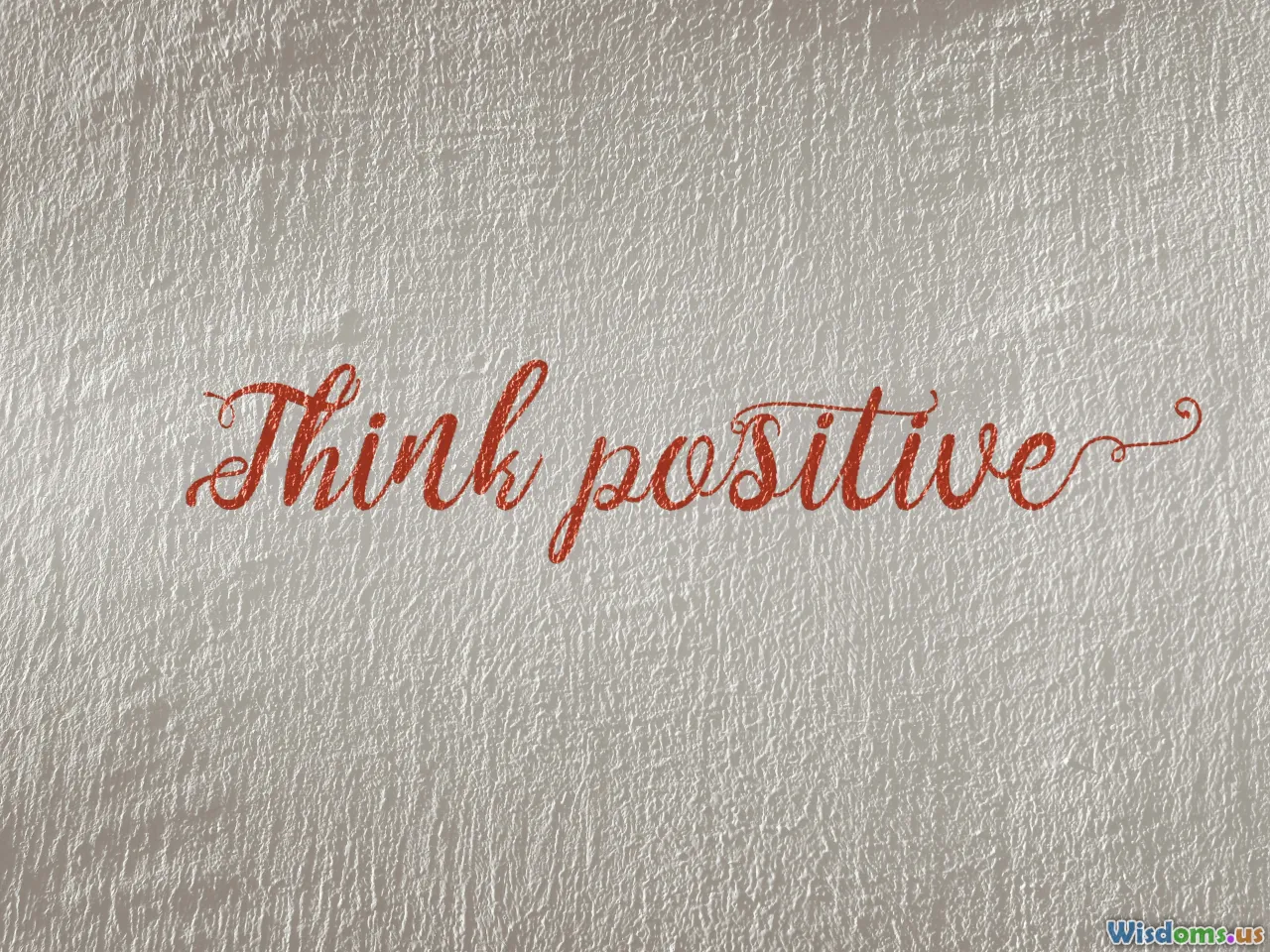
Can You Really Train Your Brain For More Self Belief
14 min read Discover science-backed strategies for training your brain and building lasting self-belief. (0 Reviews)
Can You Really Train Your Brain For More Self Belief?
The stories we tell ourselves shape our lives. Yet, so many of us wrestle with self-doubt, falling prey to limiting beliefs that make opportunities seem just out of reach. The good news? Modern neuroscience and psychology suggest you can actively train your brain for stronger self-belief—and the science is more inspiring than most self-help clichés. But what does it truly take to reshape your inner narrative?
Let's dig deeper than affirmation posters and explore science-backed strategies that anyone can practice to boost self-belief, along with real-world examples and actionable advice.
The Science Behind Self-Belief

Self-belief isn't just a feel-good slogan. It's deeply wired into our brains through the intricate dance of neurons. At the heart of this are concepts like neuroplasticity—the brain's ability to rewire itself based on new experiences, thoughts, and behaviors. When you repetitively think self-doubting thoughts, your brain strengthens those neural pathways. Conversely, focusing on confident thoughts can sculpt new, empowering circuits.
Case in Point: Consider the research on London taxi drivers. Their brains develop a significantly larger hippocampus—crucial for memory—through intentional practice visualizing London's sprawling streets. If practicing navigation can physically reshape the brain, so too can intentional focus on self-belief.
Fact: In a groundbreaking 2007 study, neuroscientist Dr. Richard Davidson found that brain circuits responsible for positive emotion and self-confidence can be bolstered through mindful practice, much like how muscles respond to repeated exercise.
It's this adaptability that forms the foundation for training yourself to genuinely believe in your own capabilities—not just faking it till you make it.
How Negative Self-Talk Shapes Your Reality

Our internal dialogues act as the soundtrack to our decisions, risks, and achievements. Negative self-talk isn’t merely noise—it directly carves out pathways in the brain that make insecure thoughts the default mode. Phrases like “I always fail” or “I'm just not good enough” leave a mark, reinforcing hesitation on auto-pilot.
Example: Professional athletes commonly cite overcoming negative mental habits as crucial to their success. Take Simone Biles, who openly discusses combating "impostor syndrome" by catching unkind thoughts and replacing them with reminders of her hard work and skills.
Analysis: If you've ever procrastinated on applying for a dream job or held back from sharing your opinion in a meeting, there’s a good chance your brain’s threat system—activated by self-critical thoughts—was part of that hesitation. Over time, such thinking diminishes motivation and shrinks our willingness to try new challenges.
The take-home message: the way you talk to yourself, even silently, is a trainable factor in your journey toward self-belief.
Actionable Ways to Re-Train Your Thoughts

Changing ingrained thought patterns isn’t about overnight transformation or relentless positivity. It's about daily, intentional strategies that re-route your thinking, just as rewiring an old habit takes repeated effort. Here are some evidence-based approaches to foster genuine self-trust:
-
Cognitive Reframing: Cognitive Behavioral Therapy (CBT) teaches how to spot unhelpful thoughts, challenge them, and replace them with realistic, empowering statements. If you catch yourself thinking, "I'm going to embarrass myself in this presentation," challenge it with, "I have prepared well, and everyone learns with every attempt."
-
Growth Mindset Training: Stanford psychologist Carol Dweck's work on growth mindset—the belief that your abilities can develop with effort—shows immense impact on self-belief. Students taught to view intelligence as malleable, not fixed, outperform their peers across the board.
-
Daily Self-Affirmations (Done Right): Repeating “I am amazing” isn’t magic, unless it’s coupled with evidence. Write down your recent achievements and contributions. Each morning, choose one to remind yourself, anchoring the statement in real accomplishment.
-
Journaling Wins (Big and Small): Logging even the smallest wins helps shift focus from failures to progress. British Olympic champion Mo Farah attributes part of his legendary perseverance to the habit of recording small breakthroughs in training—fuel for self-belief on tougher days.
-
Controlled Exposure to Challenges: Start with manageable "bravery reps." Maybe it’s speaking up in a small meeting or introducing yourself to a new colleague. Each success, even tiny, provides evidence that supports a confident self-concept.
The Role of Visualization in Rewiring Confidence

Elite performers repeatedly use visualization—a mental rehearsal technique—to boost confidence and outcomes. By vividly imagining success in challenging scenarios, they fire up the same neural pathways used during the actual event. This mental "pre-play" is so effective that MRI scans show brain activity in athletes imagining performance closely mirrors the act itself.
Real-World Example: Michael Phelps, the legendary swimmer, credits his record-shattering Olympic runs to daily visualization. Every night, he’d mentally swim flawless and imperfect races, conditioning his mind to succeed—no matter the obstacle.
How-To:
- Pause for five minutes in a quiet space.
- Picture a specific situation where you want more self-belief (e.g., an interview, presentation, or difficult conversation).
- Imagine the sights, sounds, and physical sensations, and see yourself handling it with poise.
- Feel the success—let your brain practice winning in advance.
Mindfulness and Self-Compassion: Foundations for Change

Mindfulness—nonjudgmentally observing your thoughts and feelings—acts as a spotlight to hidden patterns of self-doubt. When paired with self-compassion, neuroscience reveals a potent antidote to self-criticism.
A 2013 Harvard study found participants who practiced mindfulness and self-kindness showed increased activation in brain zones linked to emotional regulation and self-assurance.
Tips for Building These Habits:
- Mindful Breathing: Set a timer for five minutes, focusing all attention on each in-breath and out-breath. Notice when self-doubt arises, then gently redirect focus.
- Self-Compassion Exercises: In moments of self-criticism, pause to consider what you’d say to a close friend facing the same fears. Write this down, and address it to yourself.
By treating yourself with unbiased awareness and support, you break the cycle that keeps negative beliefs on repeat.
Social and Environmental Factors: The Hidden Architects

No brain exists in a vacuum. The narratives and encouragement (or criticism) from those around us play an influential role in self-belief development. Surrounding yourself with realistic optimists and mentors sets powerful expectations.
Example: In Silicon Valley, mentorship networks are key: new founders shadow industry veterans, absorbing not only technical know-how but lessons on bouncing back after setbacks—directly bolstering entrepreneurial confidence.
Practical Steps:
- Curate Your Influences: Audit your regular interactions. Are certain people eroding your self-esteem? Seek relationships that challenge and support you.
- Engage in Peer Learning: Join groups (online or offline) focused on shared goals. Mutual encouragement reinforces each member’s belief in their abilities.
- Ask for Targeted Feedback: Instead of passive praise, request feedback on specific projects. This turns abstract cheerleading into tangible belief-building data.
Technology Tools for Brain Training

Digital innovation offers plenty of new ways to train self-belief:
- Apps for Confidence Building: Tools like Lumosity or Headspace now feature modules coaching growth mindset, self-affirmation, and mindfulness on the go.
- Biofeedback Wearables: Devices that monitor physical stress (like heart rate) cue self-regulation strategies during situations that typically evoke self-doubt.
- Online Communities: Platforms like Toastmasters International or Coursera offer structured experiences—think public speaking or skill mastery—designed for incremental confidence gains.
Data Point: A 2022 study published by the Journal of Positive Psychology found that users engaging daily with guided self-belief training apps reported a 21% increase in self-reported confidence after eight weeks.
When to Seek Professional Help

While self-directed tools work wonders for many, persistent self-doubt stemming from deep-seated trauma, anxiety, or depression often require the guidance of a mental health professional. Therapists specializing in CBT, Acceptance and Commitment Therapy (ACT), or even executive coaching can work alongside you to identify blocks and establish sustainable growth patterns.
Indicators You Might Benefit from Professional Support:
- Paralyzing fear of failure prevents daily activities.
- Persistent sense of worthlessness or hopelessness.
- Self-help techniques bring little or no improvement.
Remember, asking for help is itself an act of self-belief—a declaration that your potential matters.
Sustaining Lasting Self-Belief: Small Steps, Big Changes

Training your brain for more self-belief isn’t a destination, but a practice—a sum of small steps repeated daily. Legendary tennis champion Serena Williams still relies on rituals like goal-setting, gratitude, and learning from mistakes, illustrating that even icons must work to maintain belief in themselves.
Your roadmap might look like this:
- Set weekly, achievable goals related to self-assertion.
- End each week with a review of progress, not perfection.
- Construct a "confidence toolkit"—quotes, achievements, gratitude lists—to pull from when self-doubt resurfaces.
Through consistent application of science-backed strategies, anyone can begin to tilt their brain toward self-support rather than self-sabotage.
Cultivating self-belief is neither myth nor miracle—it's skill, built through conscious effort and compassionate repetition. With your brain’s natural adaptability and the right toolset, the power to rewrite your inner story is in your hands. If today’s steps feel small, remember: each one lays a neural pathway toward a more empowered, self-assured you.
Rate the Post
User Reviews
Popular Posts



















